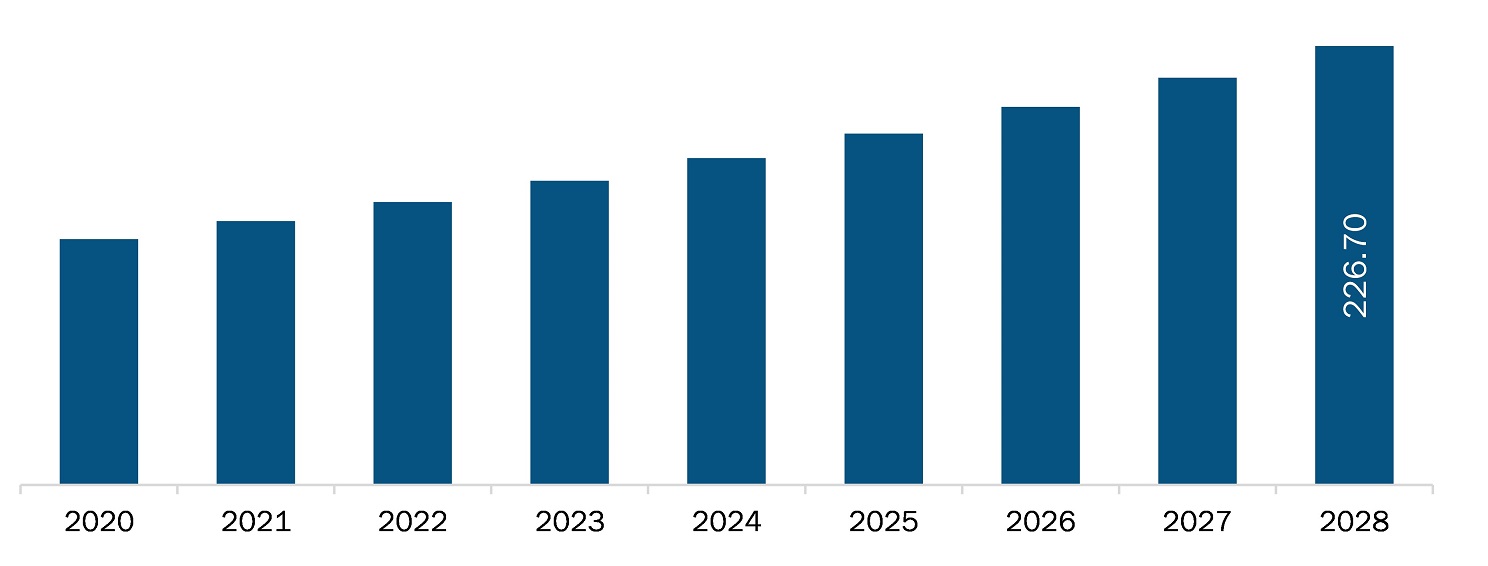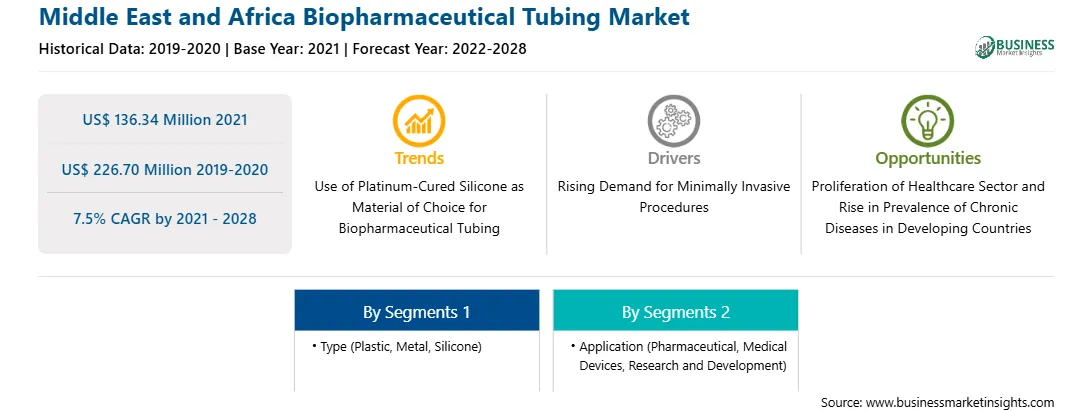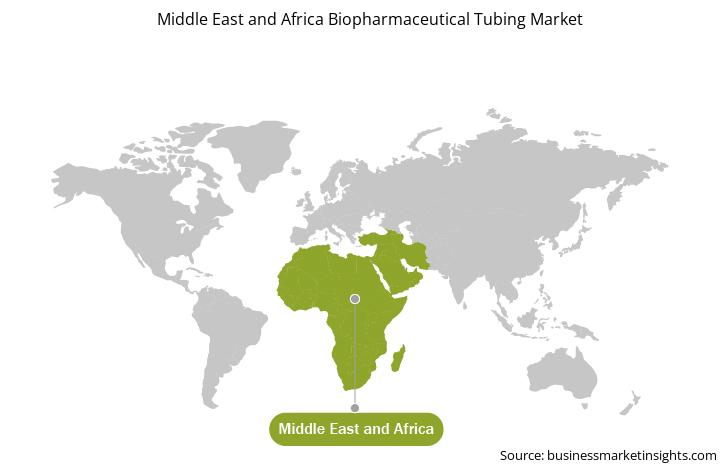The Middle East and Africa biopharmaceutical tubing market is expected to reach US$ 226.70 million by 2028 from US$ 136.34 million in 2021; it is estimated to grow at a CAGR of 7.5% from 2021 to 2028.
The growth of the market is attributed to some key driving factors such as increasing elderly population in world, and rising demand for minimally invasive procedures. However, stringent regulatory framework by government for biopharmaceutical applications is expected to restrict the Biopharmaceutical Tubing market growth during the forecast period.
Popularity of minimally invasive surgical procedures has increased in the recent years owing to the benefits such as tiny incisions, faster recovery of patients, and less discomfort caused to the patients. The growing prevalence of arthritis, cancer, and cardiovascular diseases, all of which require extensive surgical treatments, has boosted the demand for minimally invasive procedures. As a result, there is an enormous demand for catheters and biopharmaceutical tubing, among other components. Further, biopharmaceutical tubing systems are reasonably priced and aid in time-saving procedures. For example, employing catheter tubing for cardiac and urine catheterization significantly lowers the time required for the medical or surgical operation. Therefore, the growing demand for minimally invasive medical procedures and focus on increasing the efficiency of these procedures play an important role in propelling the demand for biopharmaceutical tubing. Also, growing use of platinum-cured silicone as material of choice for biopharmaceutical tubing offers several advantages over traditional peroxide cured tubing. For instance, in January 2020, Watson-Marlow Fluid Technology Group (WMFTG) launched BioPure silicone transfer tubing to confer safe, reliable, and cost-effective solution for a wide range of bioprocess fluid transfer applications. Therefore, the launch and use of platinum-cured silicone tubing as a material of choice is likely to emerge as a significant trend in the biopharmaceuticals market during the forecast period. Thus, there are significant opportunities for the market players to enter the market with superior and cost-effective products.
The COVID-19 pandemic has become the most significant challenge in the Middle East region. This challenge would be particularly frightening for the region's fragile and conflict-torn states, such as Iraq, Sudan, Israel, and Yemen, because it will result in reduced imports due to global trade disruptions, which will exacerbate shortage of medical supplies and other goods, resulting in significant rise in price. However, the biopharmaceutical tubing market in this pandemic is on rising due to the demand for medical devices that incorporate tubing in the region. Strategic insights for the Middle East and Africa Biopharmaceutical Tubing provides data-driven analysis of the industry landscape, including current trends, key players, and regional nuances. These insights offer actionable recommendations, enabling readers to differentiate themselves from competitors by identifying untapped segments or developing unique value propositions. Leveraging data analytics, these insights help industry players anticipate the market shifts, whether investors, manufacturers, or other stakeholders. A future-oriented perspective is essential, helping stakeholders anticipate market shifts and position themselves for long-term success in this dynamic region. Ultimately, effective strategic insights empower readers to make informed decisions that drive profitability and achieve their business objectives within the market. The geographic scope of the Middle East and Africa Biopharmaceutical Tubing refers to the specific areas in which a business operates and competes. Understanding local distinctions, such as diverse consumer preferences (e.g., demand for specific plug types or battery backup durations), varying economic conditions, and regulatory environments, is crucial for tailoring strategies to specific markets. Businesses can expand their reach by identifying underserved areas or adapting their offerings to meet local demands. A clear market focus allows for more effective resource allocation, targeted marketing campaigns, and better positioning against local competitors, ultimately driving growth in those targeted areas.
Middle East and Africa Biopharmaceutical Tubing Strategic Insights

Middle East and Africa Biopharmaceutical Tubing Report Scope
Report Attribute
Details
Market size in 2021
US$ 136.34 Million
Market Size by 2028
US$ 226.70 Million
Global CAGR (2021 - 2028)
7.5%
Historical Data
2019-2020
Forecast period
2022-2028
Segments Covered
By Type
By Application
Regions and Countries Covered
Middle East and Africa
Market leaders and key company profiles
Middle East and Africa Biopharmaceutical Tubing Regional Insights

MIDDLE EAST AND AFRICA BIOPHARMACEUTICAL TUBING MARKET SEGMENTATION
By Type
By Application
By Country
Company Profiles
The Middle East and Africa Biopharmaceutical Tubing Market is valued at US$ 136.34 Million in 2021, it is projected to reach US$ 226.70 Million by 2028.
As per our report Middle East and Africa Biopharmaceutical Tubing Market, the market size is valued at US$ 136.34 Million in 2021, projecting it to reach US$ 226.70 Million by 2028. This translates to a CAGR of approximately 7.5% during the forecast period.
The Middle East and Africa Biopharmaceutical Tubing Market report typically cover these key segments-
The historic period, base year, and forecast period can vary slightly depending on the specific market research report. However, for the Middle East and Africa Biopharmaceutical Tubing Market report:
The Middle East and Africa Biopharmaceutical Tubing Market is populated by several key players, each contributing to its growth and innovation. Some of the major players include:
The Middle East and Africa Biopharmaceutical Tubing Market report is valuable for diverse stakeholders, including:
Essentially, anyone involved in or considering involvement in the Middle East and Africa Biopharmaceutical Tubing Market value chain can benefit from the information contained in a comprehensive market report.